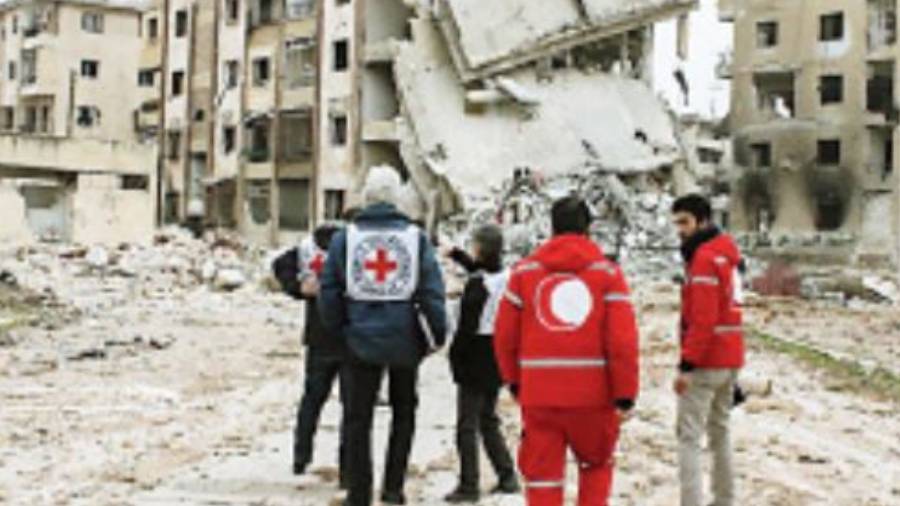The reactions and, more importantly, the actions have been quick ever since southern-central Turkey and northern-western Syria were struck by a devastating earthquake. Many countries mobilised rescue and rehabilitation operations, sending medical aid, relief material and financial support. With the death toll higher than 48,000 and counting, a concerted global effort would and is making a difference — unfortunately, only in one of the two nations.
Politics, driven by strategic interests and geopolitical alignment, have all but relegated aid to Syria as an afterthought. More than 100 countries and several international organisations, including the United Nations, have pledged support. But they are not unconditional, especially when it comes to Syria. In strife-torn Syria, where the lack of adequate mechanisms to enable rescue operations had made things worse, the slow international response has exacerbated matters. Which part of Syria receives aid, or not, depends on the relationship between the donor country or organisation and the regimes controlling the region. Northwestern Syria has four dominant regimes controlling the different regions. The pro-Bashar al-Assad regime controls Aleppo city. The Turkey-backed, anti-Assad Hay’at Tahrir al-Sham rebel group controls the Idlib governorate; the Kurdish-led Syrian Democratic Forces controls the Kobani and Manbij areas of the Aleppo governorate; and the Turkey-backed Syrian National Army, a conglomerate of anti-Kurdish armed groups, controls northern Aleppo.
This geopolitical hodgepodge has created deadlocks in aid disbursement. The Assad government has reportedly insisted on aid being sent through government-controlled territory and took almost a week to allow cross-border supply of aids. Although the Turkish border crossing is the shortest path for aid to reach rebel-controlled areas, it requires UN Security Council approval every six months. Fortunately, in January, the UNSC members, including Russia, a Syrian ally, unanimously agreed to the resolution to keep the Bab al-Hawa crossing open for the next six months to let the aid flow from Turkey to the rebel-held areas of Syria. Turkey would have been at the forefront of supplying aid to the Syrian regions of Turkish influence had the country itself not been grappling with disaster at home. Gaziantep, which has been a UN hub for supplying international aid to Syria, was the earthquake’s epicentre. Meanwhile, the UN has alleged approval issues in sending aid to the hardliner HTS-controlled areas backed by Turkey.
International aid has trickled into Syria selectively. India, for instance, sent aid, relief material and medical and rescue personnel to Turkey immediately as part of ‘Operation Dost’. But in Syria, India’s aid has gone primarily to the Assad-controlled areas. Indian aid is unlikely to reach the other affected areas controlled by the anti-Assad regimes. In the political game of aid, India has played a neutral card.
America, Europe and Sunni Arab nations, which are aligned against the Assad government, have not sent aid to Damascus. European nations have sent material to the White Helmets, an organisation that runs relief operations in parts of Opposition-controlled Syria and Turkey. A humanitarian crisis of this magnitude is clearly not reason enough for Western countries to come to Syria’s aid.
International aid will always be governed by strategic wranglings. That possibly has to do with its genesis, which lies in the Cold War-era Marshall Plan that involved aid disbursement based on strategic interests of donor countries. This Cold War geopolitical relic plays along with the image-building exercise of international politics. Caught in this complex web of interests and power dynamics, two countries and millions of people are suffering.
Debangana Chatterjee is Assistant Professor, Centre for Research in Social Sciences and Education, JAIN (deemed to be university), Bengaluru











